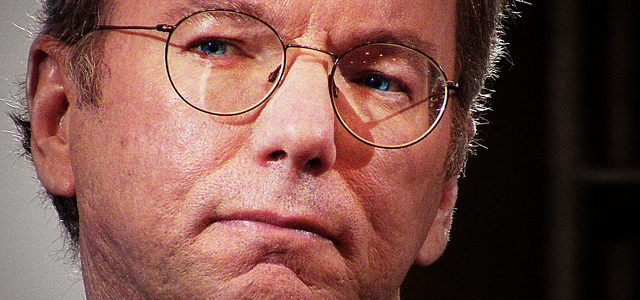
Google chairman Eric Schmidt (pictured) stated today that Google would not give favorable treatment to Motorola Mobility on Android matters, even after the acquisition deal between the two entities is complete.
“In general, with all of our partners, we told them that the Motorola deal will close and we will run it sufficiently and independently, that it will not violate the openness of Android,” said Schmidt to a group of reporters.
“We’re not going to change in any material way the way we operate.”
UPDATE: After a chat with Google, we have unpacked the apparent contradictions between Schmidt’s words and the reality of Google’s mobile business.
However, contradictory statements have already surfaced in some of the Android-related lawsuits brought against Google.
In a legal bombshell dropped in September 2011, Google documents show the company worked to give Motorola and Verizon early access to new versions of Android — and a significant time-to-market advantage along with it.
A key document from the currently pending Oracle suit against Google reads that part of Google’s plan for Android, and how to profit from a free operating system, included the following:
Do not develop in the open. Instead, make source code available after innovation is complete.
Give early access to the software partners who build and distribute devices to our specification (i.e., Motorola and Verizon). They get non-contractual time to market advantage, and in return they align to our standard.
Google first announced it intended to buy Motorola Mobility back in August.
Citing Motorola’s “total commitment” to the Android operating system, Google co-founder Larry Page wrote at that time, “Together, we will create amazing user experiences that supercharge the entire Android ecosystem for the benefit of consumers, partners and developers everywhere.”
Motorola has shown signs of concern that the deal won’t go through.
Also, the acquisition is under some pressure from Microsoft, which has its own lineup of lawsuits against both Google and Motorola.
“Investing in a broad and truly open mobile ecosystem is important for the industry and consumers alike, and Windows Phone is now the only platform that does so with equal opportunity for all partners,” said Windows Mobile president Andy Lees to VentureBeat in a recent email about the Android/Motorola relationship.
We’ve contacted Google to get more meaning on Schmidt’s statements and have written in depth about the company’s response.
Image courtesy of Jolie O’Dell.
VentureBeat's mission is to be a digital town square for technical decision-makers to gain knowledge about transformative enterprise technology and transact. Learn More

